Rehabilitation, reintroduction and protection of the Javan silvery gibbon in Mt Tilu, Java
The Javan gibbon (Hylobates moloch), IUCN listing Endangered, suffers population decline from the illegal pet trade, and hunting, as well as habitat loss and fragmentation. Unlike other gibbons ‘moloch’ only exist on Java, one of the most densely populated areas worldwide, with more than 90% of suitable forest habitat already destroyed. Usually taken as babies, and sold illegally at markets across Indonesia, gibbons are highly sought as pets and also face high demand from the world’s black market.
The Mt Tilu Javan gibbon project is run by The Aspinall Foundation Indonesia in partnership with the Ministry of Environment and Forestry, the Republic of Indonesia cq Balai Besar Konservasi Sumber Daya Alam or BBKSDA (The Natural Resources Conservation Bureau), of West Java. It is undertaken through collaborative protection of Mt Tilu Nature Reserve and surrounding forest fragments, and the reinforcement of the gibbon population by releasing gibbons from The Aspinall Foundation’s Javan Primate Rehabilitation Centre, West Java (JPRC).
Over the 24 months from mid-August 2020 to mid-August 2022 it is expected this project will achieve the following:
- completion of the pre-release programme at JPRC of approximately 12-16 Javan gibbons.
- transfer and release at Mt Tilu NR of approximately 12-16 Javan gibbons.
- post-release monitoring of Javan gibbons released at Mt Tilu NR
- release site management planning and development of strategic programmes for protection of the gibbons and their habitat together with the creation and development of education, awareness and economic incentives for people around the project site.
About the Project
Most of the Javan gibbons that will be released during this project are donated or confiscated wild-born orphans of the illegal trade in live primates. A few will come from captive breeding colonies at Howletts & Port Lympne Wild Animal Parks in the UK. The project consists of three distinct phases which begins with intensive pre-release preparation of the gibbons whilst at JPRC, long-term post-release monitoring once released at Mt Tilu NR, and multi-disciplinary site management of Mt Tilu NR to protect the habitat.
The project includes a number of key activities:
1. Quarantine & Pre-Release Screening
2. Release Site Preparation
3. Post-release monitoring
4. Education and Awareness-Raising
1. Quarantine & Pre-Release Screening
to ensure the health and suitability of individual gibbons prior to transfer to Mt Tilu NR.
2. Release Site Preparation
Temporary habituation cages are built to allow a ‘soft release’ enabling the gibbons to settle following their transfer to the site. It also allows them to return to the habituation cage if desired for a short time after release whilst the gibbons become adjusted to their new environment and gain confidence to move deeper into the forest.
3. Post-release monitoring
Daily patrols are carried out by experienced team members and gibbon observations documented.
4. Education and Awareness-Raising
including school visits, the enrolment of volunteers to participate in monitoring and awareness-raising meetings for local communities.
About Javan Gibbons (Hylobates moloch)
The Aspinall Foundation first began caring for Javan gibbons in 1984 and the first successful mating resulted in the birth of a female two years after pairing. Unfortunately the baby didn’t survive due to the young mother’s lack of experience in how to care for her offspring, but it did mark the beginning of our work to protect and save this most beautiful of gibbons.
Since then we have not only celebrated many births across both parks in Kent, but they are also part of our Back to the Wild programme, relocating them to Java, to a life of freedom in their native habitat.
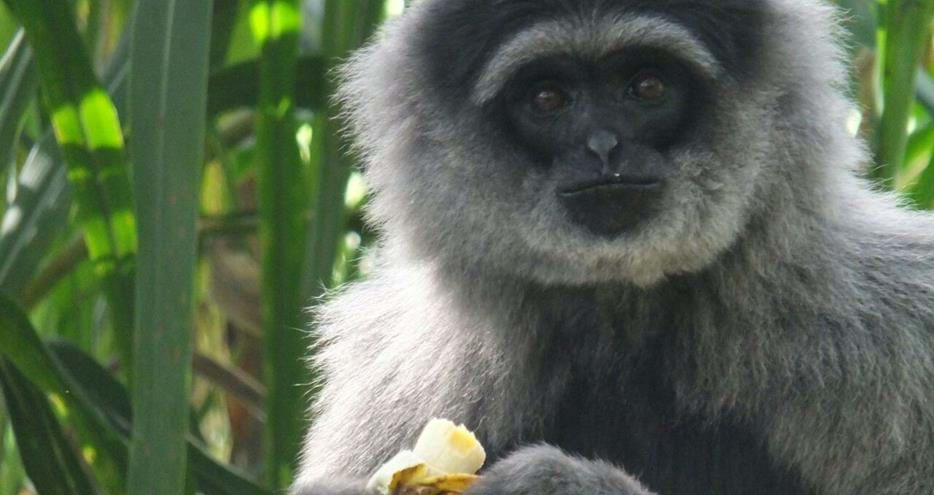
'Molochs'
Often referred to as silvery gibbons due to their dense soft grey fur, ‘molochs’ are only found in the wild on the Indonesian island of Java.
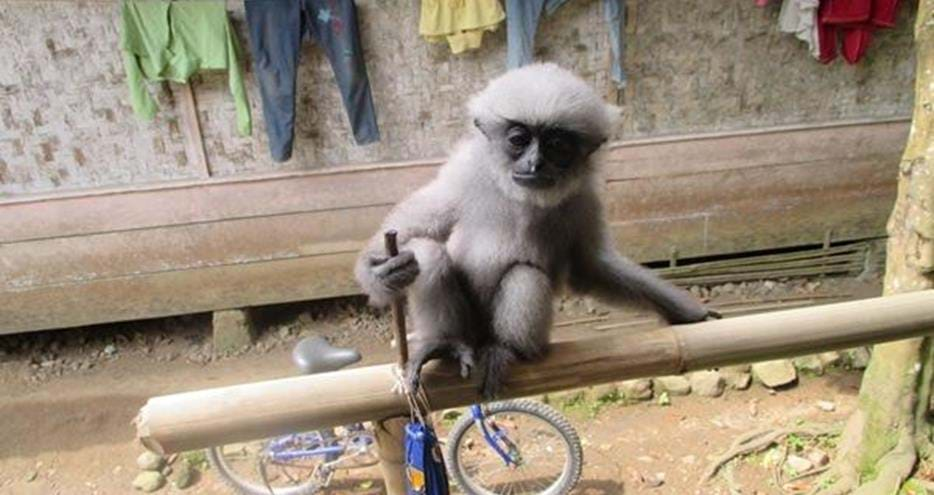
Declining population
It is probable there are below 2,500 mature individuals in the wild with no more than 250 in any subpopulation, and the numbers continue to decrease due to factors such as habitat loss from logging and agriculture. Another ongoing threat to their survival is the illegal pet trade.
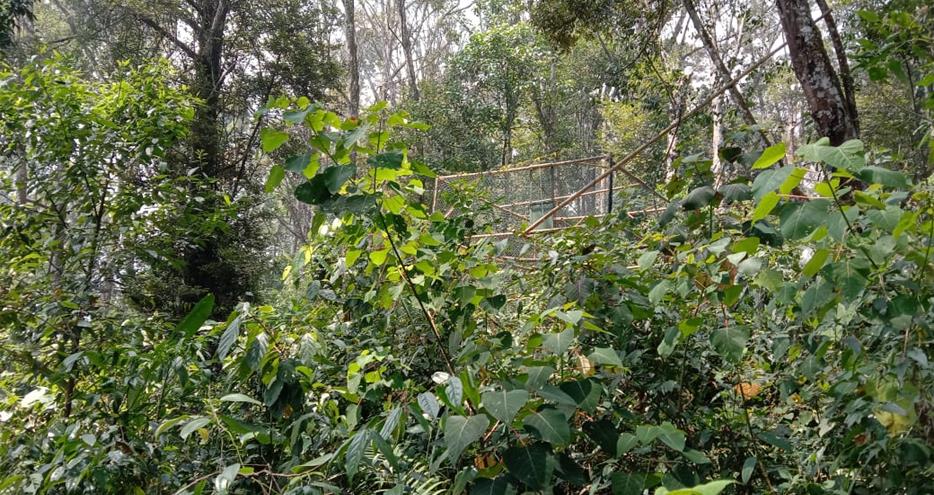
Threat of extinction
The threat of extinction is even greater because so many subpopulations are isolated from each other, fragmented when they become marooned in small sections of forest surrounded by rice fields and villages. It’s a shocking fact that it’s estimated 98% of their natural habitat has been destroyed.
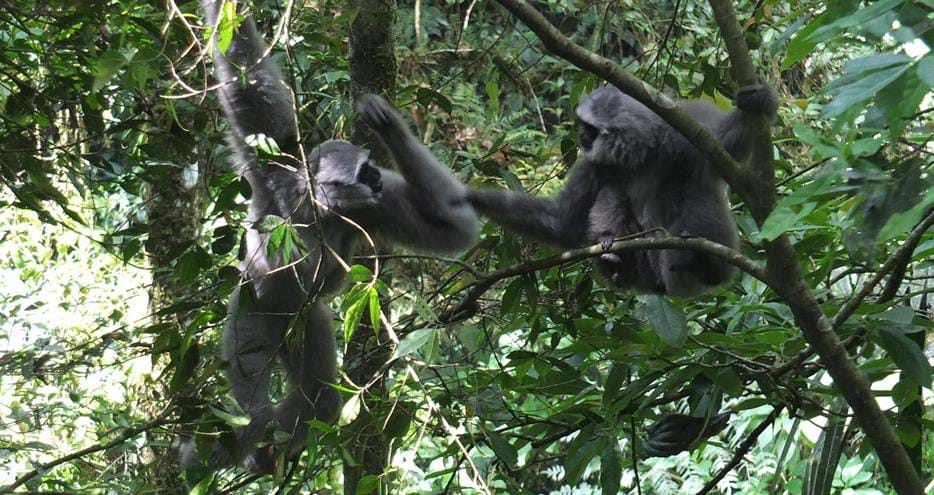
Releasing bonded pairs
Monogamous by nature, a family group is likely to be made up of an adult pair and up to four offspring living in a forest territory from which unrelated gibbons are excluded. This aspect of their nature is one we take into account when selecting release sites, and we often release bonded pairs.
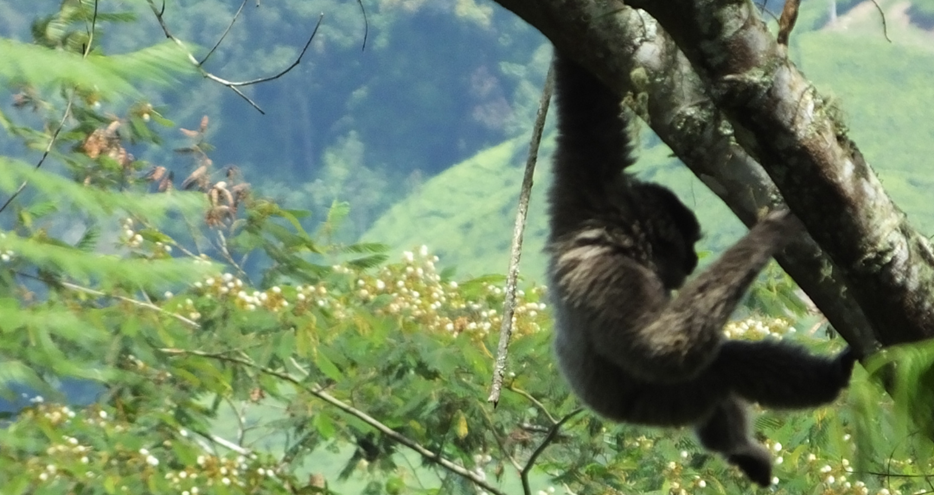
Solo releases
Sometimes this is not possible, and solo releases take place in areas that have been selected for the possibility the released gibbon will quickly find a mate. Their monogamous behaviour can be useful, and when looking to pair animals we often match captive bred gibbons with wild-born.
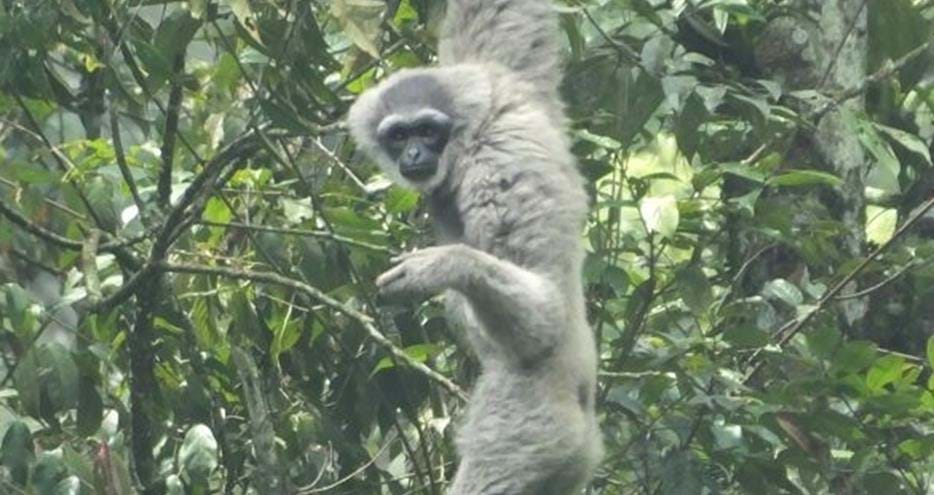
Swinging in the forest
The Javan gibbon rarely descends to the forest floor, spending most of its life in the forest canopy. They have flexible wrists and shoulders allowing them to swing their long arms from branch to branch with amazing agility. This unique form of locomotion of gibbons is called ‘brachiation’.
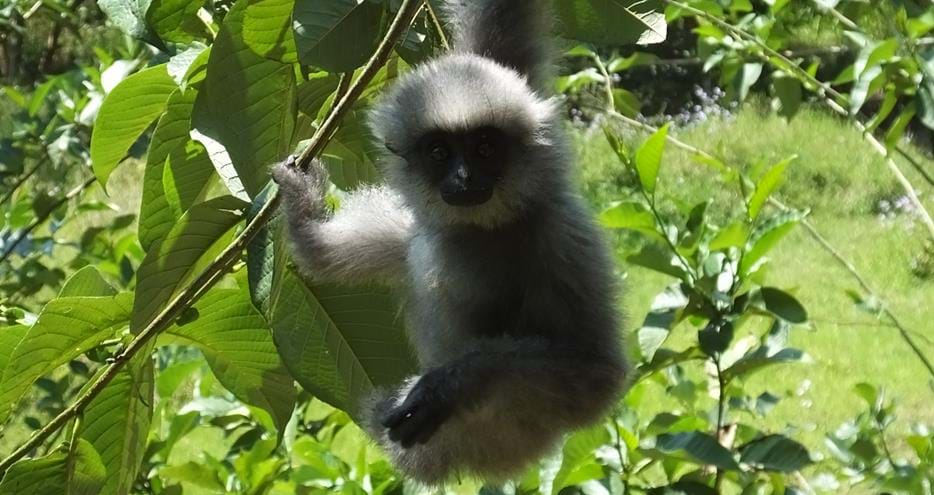
Singing female
The haunting and beautiful call of the female Javan gibbon is an amazing sound which rings out for almost a mile across the forest, a signal to other gibbons in the area that a certain patch of forest is for her and her family.

Moloch vocalisation
Unlike other gibbon species, moloch gibbons do not sing in duets, the female is the dominant vocalist while the male sings only occasionally, and mostly in the very early hours of the morning.
Our Thanks
We are extremely grateful to IUCN Save our Species who are helping to support this two-year project. IUCN Save Our Species supports science-based conservation action that saves animals and plants from extinction.
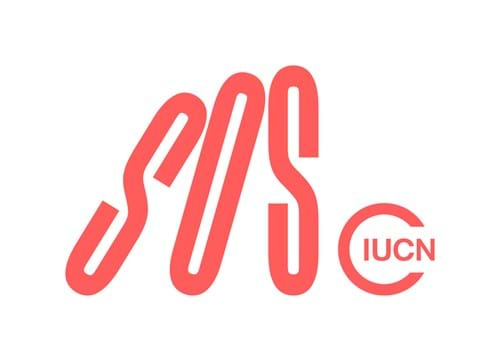
Updates
Facebook Post from International Gibbon Day
Facebook post: Our team in Indonesia rehabilitates confiscated pet Javan gibbons like Iis
Facebook post: Amazing Footage of Javan Gibbons Released Back to the Wild
Blog Post: Six Month Update on Our Project to Release Javan Gibbons at Mt Tilu NR
Blog post: Rescued Javan Gibbon Released Back to the Wild
Blog post: The Endangered Javan Gibbon - a Species at Risk of Extinction
We are proud to be registered with the UK’s Fundraising Regulator.

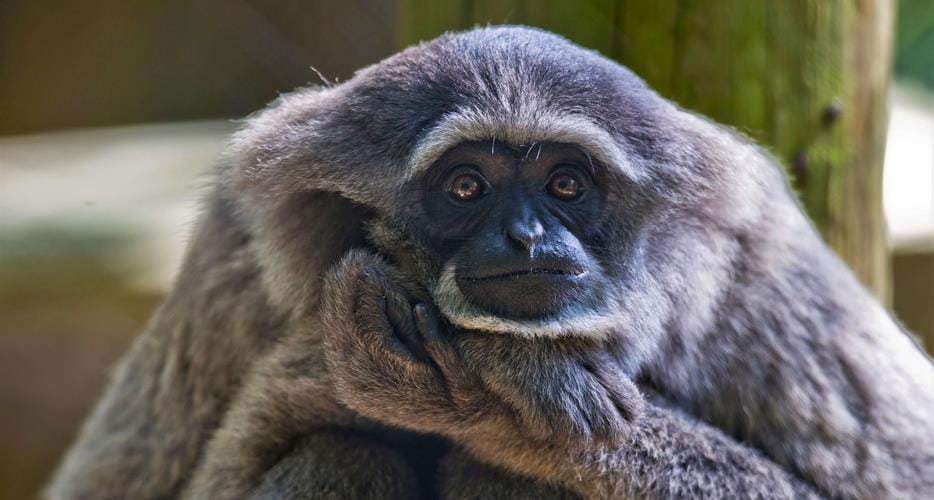
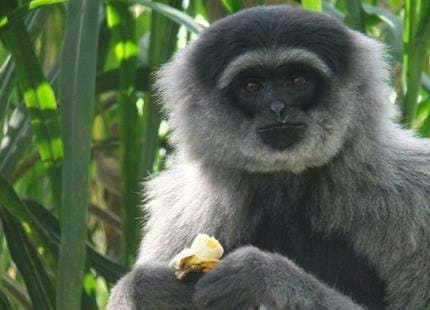 ;
;
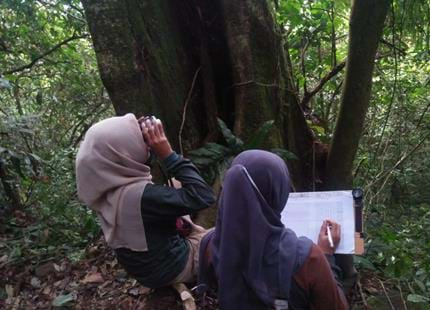 ;
;
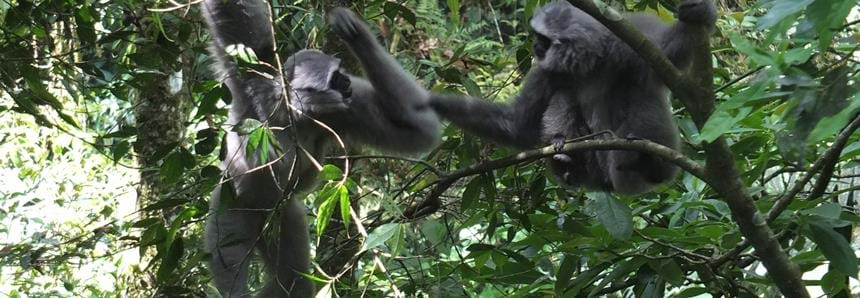 ;
;
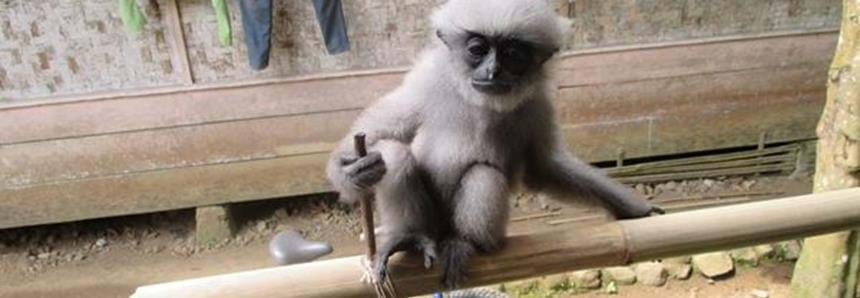 ;
;
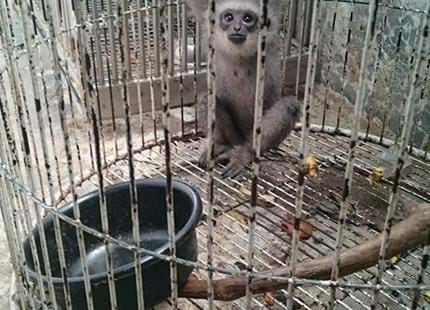 ;
;
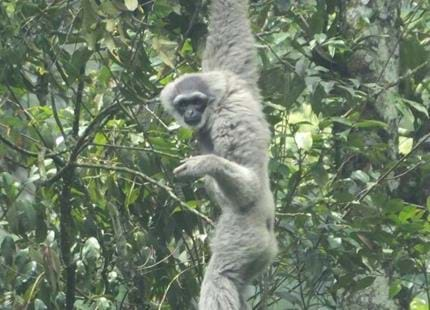 ;
;

